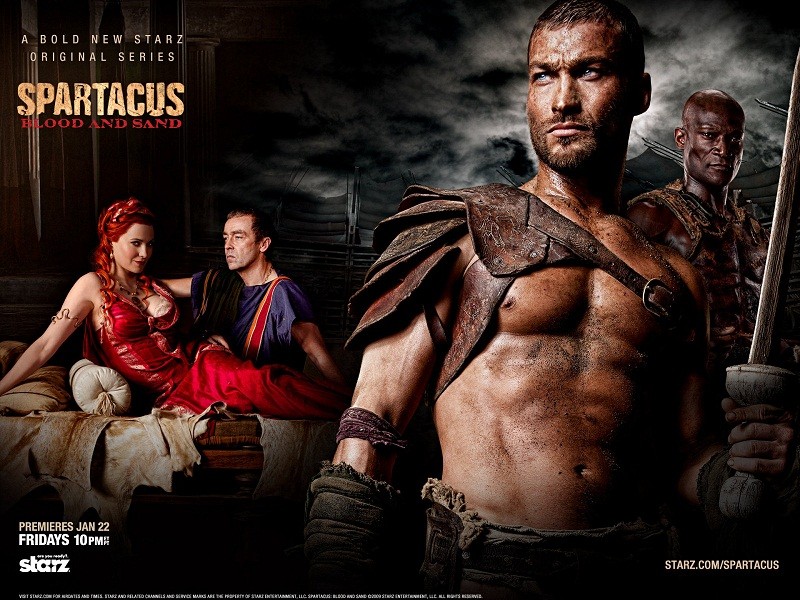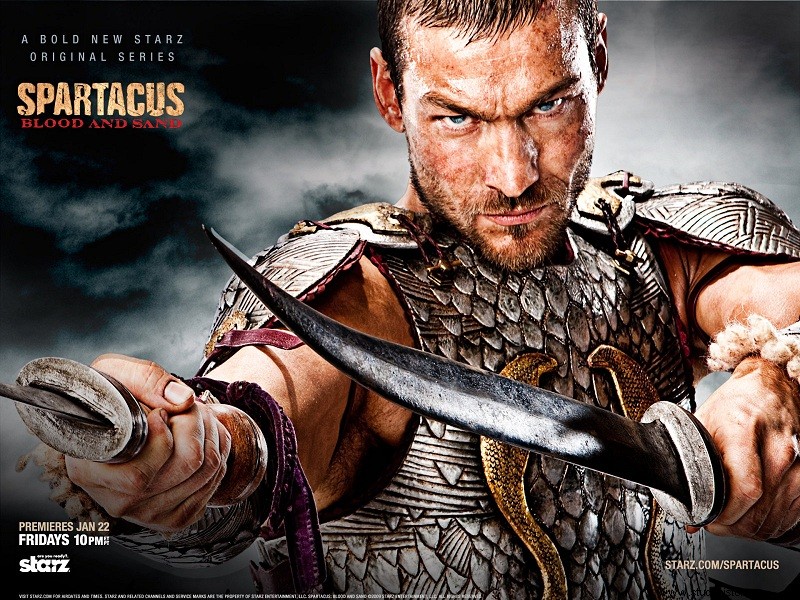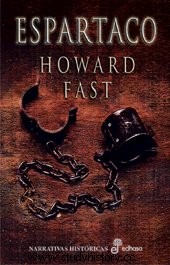Spartacus, Blood and Sand.
Capua, southern Italy, around 73 BC
A blazing sun… The sand… thousands of blurred faces and arms make up the oval that surrounds two muscular and agile men. The enthusiastic public cheers them on and rebukes them... Feints, jumps, somersaults, lunges and some punctures are lavished on stage. Suddenly, one of those Etruscan sword slashes hits the chest of one of those two men, releasing a gush of blood that spills like a gust splashing all over the screen...

Spartacus
Spartacus, Blood and Sand is a 13-episode television series produced by the Starz network. (U.S.A.) that recreates the capture and training of the legendary gladiator Spartacus until he mutinies. It is not a series that reflects the complete history of the character, but only an essential part of it. The historical Spartacus was a Thracian (today Bulgarian) auxiliary of the legions who deserted. Being captured, and not being a Roman citizen, he was sentenced to hard labor in a plaster cast. His physical strength, coupled with his obvious military knowledge, led to a Capua lanista named C. Cornelius Lentulus Batiatus acquired it for his gladiatorial school. This is the stage that we will see in the series that is currently broadcasting Cuatro .

Howard Fast
In principle, the “dramatis personae ” is different from those that appear in the great novel by Howard Fast on which Stanley Kubrick was based to shoot his Spartacus in 1960. In addition to the Thracian hero (the role of Kirk Douglas now he is played by Andy Whitfield ), his partner Crisus also appears in the series. and the aforementioned lanista Batiato (immortalized for celluloid by Peter Ustinov in Kubrick's film and starring here John Hannah , the second of The Mummy ), the ruthless gladiatorial instructor, Doctore (in this series akin to Spartacus ) and the legacy Claudio Glabro and his wayward wife Lithia (The attractive Australian actress Viva Bianca )
As a novelty we find the ambitious wife of Batiato, Lucretia (Lucy Lawness in the series, she known for her role as Xena the Warrior Princess ) and I miss Varinia , his future traveling companion, and Marcus Licinius Crassus , an indispensable piece in the works of Fast/Kubrick how well embodied Sir Lawrence Olivier .
The staging of the series is quite faithful to the direct and explicit style that prevails today in this type of epic production. As we saw in 300 (which he brazenly copies) or in the British Centurion Liters and liters of blood of different thicknesses are poured without the slightest hesitation, accompanied by the occasional morbid dispute and a lot of turgid meat in motion. As an extra ingredient to so much violence, the risque scenes sneak in between so much sweaty muscle and blood everywhere, some appropriate and even appropriate, but others perhaps not very credible. I am not the one to judge whether that implicit eroticism is correct or not; Personally, I think that if it shows and characterizes the cloudy society of that time (crisis of the old values in the midst of the civil war in Hispania between Pompeyo and Sertorio ), lacking our Judeo-Christian moral ties, is correct, even if it shocks those who do not know in detail what Rome was like at the end of the Republic.

Spartacus, blood and sand
The clothing is discreet, I would almost say absent in many passages, with some equipment errors in Glabro's troops. , as well as the sparse setting of the school and the exteriors of Thrace or Capua. One detail that surprised me is that they present us with amphitheaters when they did not yet exist (the gladiators fought in removable arenas in the squares that, in order to clean their slabs better once the show was over, were previously covered with sand; hence the name of the thing)
Recorded in New Zealand with good means, the abuse of special effects makes the true details that enrich these works go unnoticed. The slow motion in each bloody combat, the pastel tones or the sickly body perfection cloud the atmosphere of the time; obviously the gladiatorial school of a discreet lanista from Capua in 73 B.C. it would be otherwise...
Andy Whitfield He has cancer; that's why Starz has recorded Spartacus, Gods of the Sand , a derivation prior to the events of the series in which the character of Spartacus does not appear, waiting for the aggressive treatment that the Welsh actor is receiving to bear fruit and he can return to the sets.
In short, if you loved the novel by Howard Fast (which I highly recommend) and Kubrick's subsequent cinematic gem. , if you are shocked to see how a slave gropes her mistress while another slave stimulates her master during a normal conversation, or you find it unpleasant to see nudity, coyunda, blood and viscera gushing, do not watch Spartacus, Blood and Sand . Now, I don't want to demonize the series for its excess of violence and gratuitous sexuality either, because for lovers of action and eroticism it has some memorable scenes; is not as balanced in dialogue and content as HBO's Rome , but neither is it as implausible and Manichaean as Hispania de Antena 3 .
Note :
Howard Fast wrote Spartacus in 1951 while imprisoned for his militancy in the Communist Party of the United States . A self-made man and a prolific writer, due to his political ideas he was crushed by the US administration, coming to boycott the publication of several of his books. His masterpiece is Spartacus , an allegory to the fight for freedom that shows the vileness of a capricious and oppressive society that lives off the defenseless and the ignorant. Many of his detractors argued that Fast He equated ancient Rome with the United States. Serve as a reference his dedication:
For those who read me feel strong enough to face this uncertain future of ours and be able to fight against oppression and injustice

Spartacus - Howard Fast
It was Kirk Douglas (son of Russian immigrants) who convinced Universal to turn this novel into a movie and, after some hesitation, they chose to have Stanley Kubrick to roll it. The result was 4 Oscars and one of the jewels of epic cinema.
Collaboration of Gabriel Castelló
